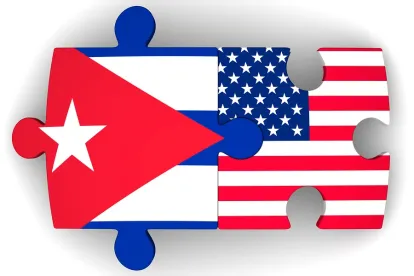Since Cuba and the United States agreed to reestablish relations in December 2014, foreign investors have navigated an uncertain path in the Caribbean island. The Cuban Government has been implementing a new legal framework to lure foreign investors by enacting a new foreign investment law and establishing the Special Economic Development Zone of Mariel (free trade zone), among other measures. Nevertheless, Cuba continues to be one of the most challenging markets to invest in.
President-Elect Donald Trump’s election has sparked fears that the new U.S. Administration will roll back President Barack Obama’s plan to normalize relations with Cuba. Thus, the big question now for foreign investors, especially U.S. investors, is whether there will be a change in the current policy. Companies like Sheraton, Carnival and Airbnb have already started operations in Cuba, while others are expected to do so in the very near future. So, what’s next for those companies?
At this stage, it is hard to predict what will happen in the next few months, particularly when we take into account the fact that the newly elected president has shown different positions on the subject. During the Republican presidential primaries, President-Elect Trump appeared to endorse the Obama Administration’s policy to restore relations with Cuba. Toward the end of the presidential election campaign, President-Elect Trump called President Obama’s deals with Cuba “one-sided” and beneficial “only [to] the Castro regime.” He also promised to repeal Obama’s Executive Orders on Cuba unless the Cuban Government meets his demands to restore political freedoms and free political prisoners. Vice President-elect Mike Pence confirmed this harder stance on Twitter, saying the U.S. trade embargo will continue until there is real political and religious freedom in Cuba. This position does not seem to have changed after Fidel Castro’s death, as President-Elect Trump has since stated that “If Cuba is unwilling to make a better deal for the Cuban people, the Cuban/American people and the U.S. as a whole, I will terminate deal.”
Meanwhile, the Trump Transition Team continues to announce names to the “landing teams” that will help select political appointees to Departments and agencies in the Trump Administration, as well as review existing Obama Administration policies. Recently, Mauricio Claver-Carone was noted to have joined the Treasury Department landing team. Mr. Claver-Carone takes a strong position against lifting U.S. sanctions on Cuba and has led efforts to sustain the U.S. embargo. His role on the Treasury Department landing team is worth noting, particularly since the Department has primary jurisdiction over sanctions enforcement.
Meanwhile, the U.S. Congress remains divided on the U.S. policy toward Cuba. On the one hand, Speaker Ryan, Representative Ileana Ros-Lehtinen (R-Florida), and Senator Marco Rubio (R-Florida) remain vocal opponents to normalizing relations with the Castro government. On the other hand, there is congressional support for removing the trade embargo, including among Senators Jeff Flake (R-Arizona) and Rand Paul (R-Kentucky).
While the debate on the U.S. embargo is expected to continue, presumably a powerful coalition of U.S. companies and other interest groups will keep pushing for greater engagement with Cuba in the hopes that the incoming Trump Administration will not reverse what has been done thus far. As for other companies already investing in Cuba, or intending to do so in the future, they should remain alert to any developments and, where necessary, make sure their interests are being protected as possibly policy shifts flow from Washington. With all this uncertainty, the one thing that is clear is that what happens in Washington in the upcoming months will be crucial in terms of these companies deciding what do next: move forward or backtrack.




 />i
/>i

